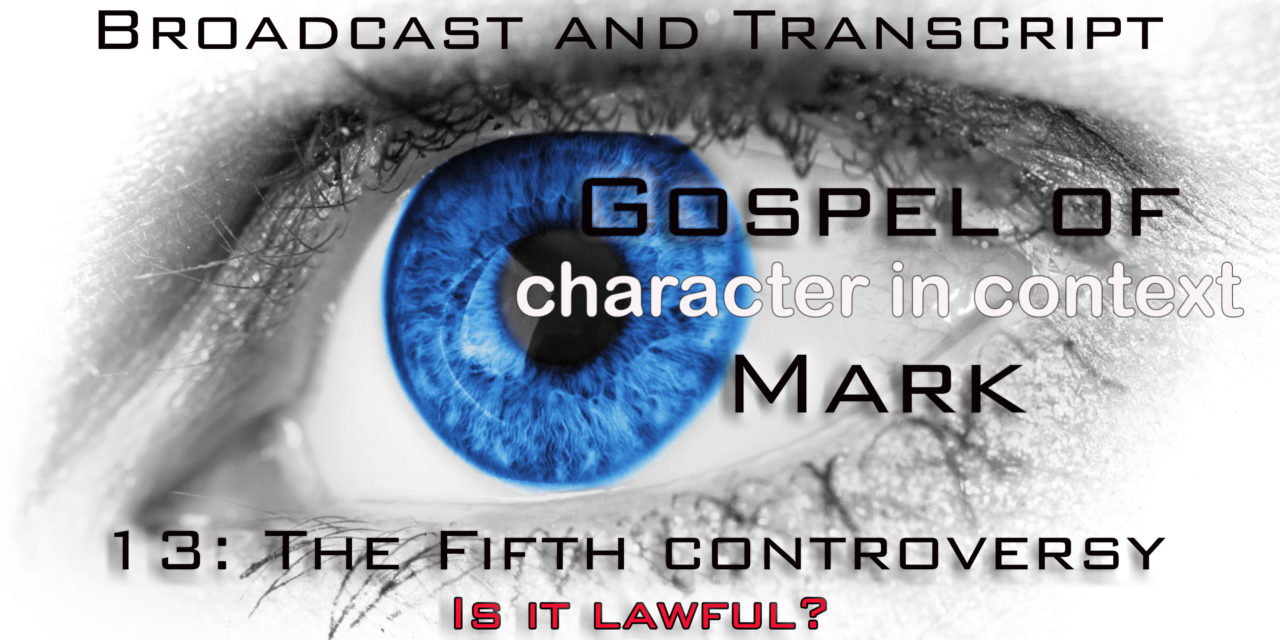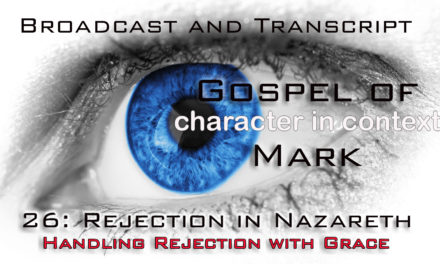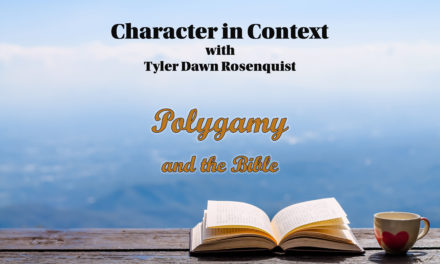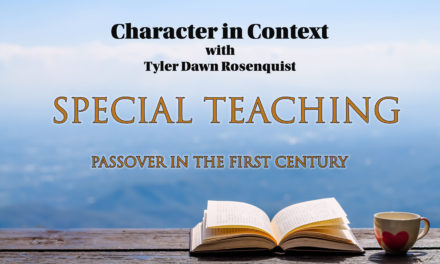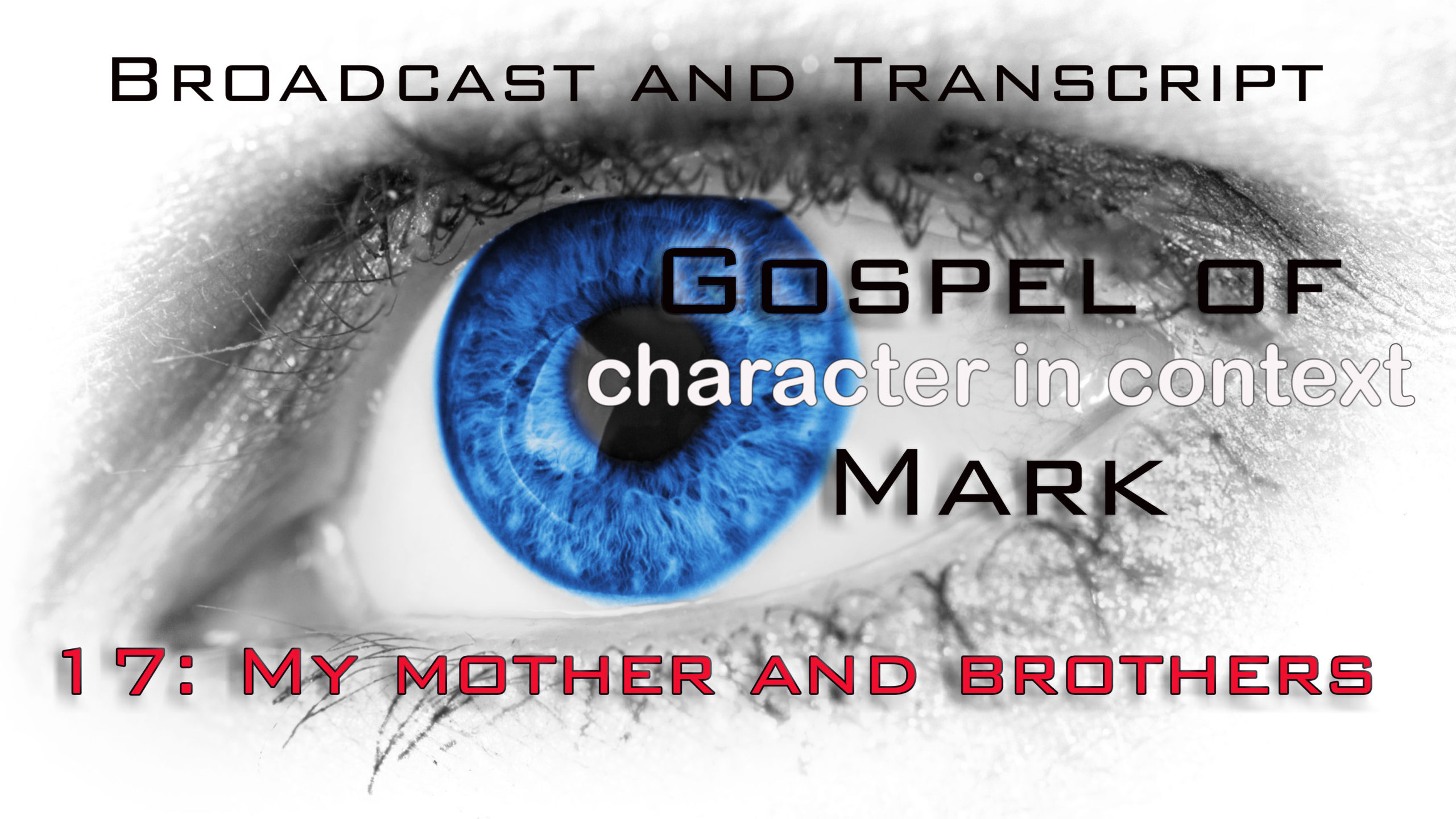What’s lawful on the Sabbath? To restore a man to the community and to service or to plot a political assassination?
And I want to say a word about looters and rioters vs peaceful protesters and activists and what they have in common with people who adopt fake Hebrew names on social media. (in the audio only)
*****************
Mark 14—Is it Lawful? The Withered Hand.
3 Again he entered the synagogue, and a man was there with a withered hand. 2 And they watched Jesus, to see whether he would heal him on the Sabbath, so that they might accuse him. 3 And he said to the man with the withered hand, “Come here.” 4 And he said to them, “Is it lawful on the Sabbath to do good or to do harm, to save life or to kill?” But they were silent. 5 And he looked around at them with anger, grieved at their hardness of heart, and said to the man, “Stretch out your hand.” He stretched it out, and his hand was restored. 6 The Pharisees went out and immediately held counsel with the Herodians against him, how to destroy him.
This is the fifth and final controversy dialogue. And as you can see, it’s gone from just thinking thoughts about blasphemy, to plotting His death. But as I have said before, remember that Mark groups his stories by topics and not chronologically in order to teach us important things about the order of progression. Everything he wrote shows the situation going from relatively mild and even positive, to ramping up to something much more deadly and serious.
Like the last controversy, this one also takes place on the Sabbath, and, once more, no specific location is given. But I want to say that the reference to I Samuel 21 and 22’s brouhaha between David, Saul, and Doeg is going to be hinted at again, with the Pharisees in the role of King Saul, and the Herodians appropriately in the role of Doeg the Edomite. Although these two accounts can be linked and might have even occurred on the same day, I am covering them separately in order to do justice to the accounts. But they obviously were meant to be read in the same sitting so that these associations could be recognized.
Hi, I am Tyler Dawn Rosenquist and welcome to Character in Context, where I teach the historical and ancient sociological context of Scripture with an eye to developing the character of the Messiah. If you prefer written material, I have five years’ worth of blog at theancientbridge.com as well as my six books available on amazon—including a four-volume curriculum series dedicated to teaching Scriptural context in a way that even kids can understand it, called Context for Kids—and I have two video channels on YouTube with free Bible teachings for both adults and kids. You can find the link for those on my website. Past broadcasts of this program can be found at characterincontext.podbean.com and transcripts can be had for most broadcasts at theancientbridge.com
All Scripture this week comes courtesy of the ESV, the English Standard Version but you can follow along with whatever Bible you want. Whatever floats your boat and gets you reading, right? Unless you are a scholar, truly, it doesn’t matter that much. Heck, before modern times normal people like us didn’t even have access to bibles at all and a lot of us wouldn’t have ever been taught to read anyway! They had to rely on hearing the word from others and on the refining work of the Holy Spirit. Sometimes we forget that most of history as been the non-information age and yet, greater saints than ourselves existed and thrived.
3 Again he entered the synagogue, and a man was there with a withered hand.
As I was hinting at earlier, don’t make the mistake of assuming that the chapters and verses are actually divinely ordained—sometimes they break up things that should have been combined. They were put in for ease of finding things and not generally for sound theological purposes. Just because this is chapter three doesn’t mean that it doesn’t fit in more appropriately with the rest of chapter two. And we start with “again” because entering synagogues is just what He does, right? It’s what all faithful Jews did if they had one nearby. It was a delight to gather on the Sabbath and discuss God’s Word, which up to this point consisted solely of the Torah, the Prophets and the Histories and Poetry. It goes without saying (then why am I bothering to say it) that none of the first-century writings were even written yet. Not like Yeshua was going to open a KJV, right? Which, I need to mention, does not stand for the King Jesus Version. I did once hear someone remark, in dead seriousness, that if the KJV was good enough for Jesus and His disciples then it was good enough for him. And no, I am not making fun of him but it is interesting the illogical stuff we believe just because it has never been pointed out to us how illogical it is. You know, you get people swearing up one side and down the other that certain fictional verses are in the Bible—and this was before search engines but even now that search engines exist there are folks who will not be convinced that their favorite mythical verses aren’t in here.
Yeshua entered the synagogue—no word about His disciples being with Him but if this was right after the grain-plucking incident we can assume that they were there. There, among the faithful Jews in attendance, was one man with a withered hand and I have to tell you that this was a particularly humiliating disability for a number of reasons. They are (1) the association with the sin of Jeroboam, and (2) having only one usable hand would mean that the same hand he uses for the bathroom would be the only hand he could eat with or touch other people with as well.
Let’s talk about Jeroboam’s sin real quick here and we find that in I Kings 13:1-10
And behold, a man of God came out of Judah by the word of the Lord to Bethel. Jeroboam was standing by the altar to make offerings. 2 And the man cried against the altar by the word of the Lord and said, “O altar, altar, thus says the Lord: ‘Behold, a son shall be born to the house of David, Josiah by name, and he shall sacrifice on you the priests of the high places who make offerings on you, and human bones shall be burned on you.’” 3 And he gave a sign the same day, saying, “This is the sign that the Lord has spoken: ‘Behold, the altar shall be torn down, and the ashes that are on it shall be poured out.’” 4 And when the king heard the saying of the man of God, which he cried against the altar at Bethel, Jeroboam stretched out his hand from the altar, saying, “Seize him.” And his hand, which he stretched out against him, dried up, so that he could not draw it back to himself. 5 The altar also was torn down, and the ashes poured out from the altar, according to the sign that the man of God had given by the word of the Lord. 6 And the king said to the man of God, “Entreat now the favor of the Lord your God, and pray for me, that my hand may be restored to me.” And the man of God entreated the Lord, and the king’s hand was restored to him and became as it was before. 7 And the king said to the man of God, “Come home with me, and refresh yourself, and I will give you a reward.” 8 And the man of God said to the king, “If you give me half your house, I will not go in with you. And I will not eat bread or drink water in this place, 9 for so was it commanded me by the word of the Lord, saying, ‘You shall neither eat bread nor drink water nor return by the way that you came.’” 10 So he went another way and did not return by the way that he came to Bethel.
In addition, Psalm 137:5 lists a withered hand as one of the signs of being cursed for faithlessness to Jerusalem: If I forget you, O Jerusalem, let my right hand forget its skill!
Zechariah 11:17 also lists a withered arm as a curse: “Woe to my worthless shepherd, who deserts the flock! May the sword strike his arm and his right eye! Let his arm be wholly withered, his right eye utterly blinded!”
As you can imagine, those verses did not really bode well for how the man with the withered arm was publicly received and though of. The withered hand was associated with being cursed in Scripture and even though we know darned well that disability can come from a whole host of causes, they didn’t. If you had something seriously wrong with your body either you or your parents sinned (even if it was only in secret) and you had it coming. Although, you know, I was never sure about this idea that you were born disabled because of your sin. Was this like supposed to be pre-emptive judgment? I’ll tell you what it’s definitely like—adding insult to injury, you know like the guy’s life isn’t hard enough with only having one usable hand, folks imagine that he deserves it too.
2 And they watched Jesus, to see whether he would heal him on the Sabbath, so that they might accuse him.
Now, by this time, Yeshua was well known as a miracle worker and healer. So, I have a question—why didn’t he ask Yeshua for healing? The situation is really strange. We have a group called “they” who were watching him, with nothing to give us even the slightest hint of who “they were” UNLESS they were the same Pharisees from the last controversy, which is actually implied in verse six. In fact, this entire episode makes a lot more sense if the whole incident of plucking grain in the fields happened on the Sabbath, on the way to the synagogue. You have Pharisees who were either following them or who happened to run into them, could go either way, and who saw the disciples plucking heads of grain and challenged Yeshua on His disciples’ behavior (because He was considered to be the responsible party, not them), and he drops the mic on them with His response to their challenge and then we have Him entering the synagogue. So, for purposes of argument, let’s pretend like these people watching Him now are the same Pharisees who watched Him before. This really makes it look like an escalation in His run-ins with people. First, we saw them (scribes) showing up at the place where He was staying in Capernaum, and then the scribes of the Pharisees take notice of His eating with Levi, next, we have what seem to be normal people asking Yeshua why His disciples weren’t fasting. In the fourth incident, Pharisees are somehow watching Him or run into Him while His disciples are picking grain and now there is this “watching” going on in the synagogue by, for the sake of argument, the same Pharisees who were in the fields with them. The accusations started silently, in their thoughts, and then were spoken only to the disciples, and then to Jesus directly about the behavior of His disciples by normal Jews, and then by Pharisees about the behavior of His disciples, and now they are pretty much lying in wait for Him to act. We have a definite escalation in every account. This will be, by far, the most serious of the five. Now, they want to accuse Him and are positioning themselves for the opportunity.
So, was this man with the withered hand a regular attendee? Or did they bring him in? Was he an outcast? The chances are pretty good in a culture with no hand sanitizer where no one wants a one-handed man to break bread with them or dip in the common pot of food. I am thinking he was an outcast—whether he was a sinner or not, the text does not say.
But why would they accuse Him if He dared heal the man? Because minor cures were not allowed on the Sabbath—only life-saving cures. And yet, this man had no place in the community with a hand withered like this. He had no life. They couldn’t afford the luxury of being introverted back then—no one was. You needed community and you were nothing without them. Restoring someone to community life was lifesaving work.
3 And he said to the man with the withered hand, “Come here.”
Yeshua knows full well that He has walked into a trap but He doesn’t care. The Kingdom of Heaven has arrived and is invading our reality in His person and so that means one thing and one thing only—this man has to be restored. So, Yeshua ignores (for the time being) the Pharisees and says to the man “Come here.” And that word is one you will recognize if you have been following this series—egeiro! That’s right, the resurrection word! And I am going to say, right here, that Yeshua is provoking them—and that’s not all. He is about to double down.
4 And he said to them, “Is it lawful on the Sabbath to do good or to do harm, to save life or to kill?” But they were silent.
Now, all He has done at this point is to tell the guy to come over to Him. No healing has been performed at this point, but he is about to trap them in their own snare. This was a classic honor/shame debate tactic—showing one’s own wisdom vs the foolishness of your opponent. If you know about honor/shame culture, you know the reason why everything is done in front of an audience—because, in that kind of society, everyone is always jockeying for position. I have said many times that if I lived in a society like that I would probably just hide because this would be torture for me—but it was their world and their culture and they knew no other way so I imagine they very much enjoyed doing this.
Men would debate, dialogue, and issue challenges in hopes of winning the approval of the crowd. The Pharisees here had been watching and waiting for an opportunity to accuse Him, as per the text, and by doing so publicly shame Him as a Sabbath violator (according to their interpretations and extra-biblical opinions). He just doesn’t give them a chance and He asks a question that they can’t answer without making it look like they approve of Him in just a minute here. They can’t say it is lawful to do harm, right? They also can’t say it is lawful to kill. So they shut their mouths entirely. Their challenge was over. He went higher in the crowd’s estimation and they didn’t even get to launch a volley and had possibly even given Him the opportunity by bringing this poor soul to the synagogue in the first place.
But what Yeshua said is far fore damning in the Greek. The word translated kill is apokteno, and it is a word used in Greek for political assassinations. We’ll get back to that in a minute. He obviously isn’t saying that they will be killing this man if he is denied healing, so the remark is kind of puzzling to the crowd—because they don’t have a narrator. Lucky us!
Make no mistake, He said to them, “I know exactly what you are planning, and on the Sabbath, no less. You are all Sabbath violators.”
5 And he looked around at them with anger, grieved at their hardness of heart, and said to the man, “Stretch out your hand.” He stretched it out, and his hand was restored.
No shock that He is angry when every ounce of compassion within Him demands that He set this man free on the sabbath, to once more be a productive and included member of the community—and they want to use that for petty reasons. If they truly understood (from last week) that sabbath was for the benefit of man, that it serves man and not the other way around, then they would want this man restored. But he’s just an opportunity to discredit Yeshua based on petty arguments that will, in and of themselves, never do a thing to lift the terrible burdens this man carries. Their hearts are hardened, like Pharaoh. That’s right, another link to the Exodus theme.
Yeshua says, “Stretch out your hand.”
Now, why should that sound familiar? Where else do we see a reference to that? In Genesis 3
22 Then the Lord God said, “Behold, the man has become like one of us in knowing good and evil. Now, lest he reach out his hand and take also of the tree of life and eat, and live forever—”
After the sin in the Garden, Adam and Eve were permanently prevented from stretching out their hands to eat of the Tree of Life by being exiled from the Garden, from paradise—they had to go out and live in the world where they had to work hard every day just to survive. When Yahweh gave the Sabbath to Israel at Sinai, it was a once a week return to Paradise where they could escape the world where they had to survive through hard toil okay? So, the Sabbath is inherently a time of rest and restoration. I’ve talked about this before—not only is it a time for healing, as with Peter’s mother in law, it is the most appropriate time for healing because Sabbath is a glimpse of the world to come where there will be no more sickness. We lost paradise, but once a week we get to live a whole lot nearer to it. If sabbath represents God resting in the midst of His Creation, and our release from slavery and Egypt, why would it honor God for people to be suffering on that day above all others? Isn’t it an abominable shame? Is He really going to be impressed with our trying to keep people in bondage on the day of our release from it?
Yes, Yeshua was angry and with good reason. Not only because He knew what they were about to go and do, on the Sabbath no less, but because they had no compassion on this man’s predicament. They would rather see him shamed, suffering, and outcast than restored, rejoicing and reintegrated back into the community of Israel.
Yeshua tells this man, who hasn’t spoken a single word up to this point, which would be understandable If he lived as a shamed outcast, to stretch out his hand and he does so. The hand was restored. No one did any work even. Yeshua spoke no incantations, uttered no words commanding healing. He just told the man to stretch out his hand and the man obeyed. In the end, no one could even accuse Him of having done any work. All they could do was glorify God. But we don’t hear about that happening (although I am certain that the townsfolk did just that).
What was the response of the Pharisees?
6 The Pharisees went out and immediately held counsel with the Herodians against him, how to destroy him.
They just left and immediately, that means on the Sabbath, met up with the Herodians. Now, the Pharisees hated the Herodians—you need to know this. The Herodians were supporters of Herod and therefore Roman collaborators. Herod Antipas was a Jew only because his great-grandfather had converted when John Hyrcanus conquered Edom and told all the inhabitants to become Jews “or else.” So, the children of Esau were forced into the fold of Judaism—but they were never accepted by the Jews. The thing is—the Pharisees had zero political pull of power. The only thing they had was influence with people, but actual authority, zero, zip, zilch, nada! As much as it would have galled them, just to no end, they found themselves holding their noses in order to collaborate with their despised enemies—but enemies who actually did have power. If they were going to do away with Yeshua (which didn’t happen, they ended up somehow unable to follow through and it was left to the Sadducees to do the dirty work), but if they were going to be successful, they needed power. The Herodians supplied that—or at least in Galilee, they did. Remember that this is not chronological and that Mark is presenting subject blocks—not a timeline. If this happened right before Yeshua and His disciples left Galilee for Judea, then there was no opportunity for this alliance to bear fruit. Or perhaps the Herodians just didn’t care and sent them packing. The text doesn’t really say here. If Herod Antipas’s power wasn’t threatened, they might not have really been interested in the uproar that this would create on Herod’s home turf.
But let’s not miss the big punch line because they left the synagogue and went immediately to the Herodians, which means they were plotting to destroy Him on the Sabbath. Remember His challenge to them?
4 And he said to them, “Is it lawful on the Sabbath to do good or to do harm, to save life or to kill?” But they were silent.
“Is it okay with God, on the Sabbath, to do something good for a person or to harm him? Does God want us to save a life or assassinate life?” Because, remember, that’s what that word translated as kill meant, apokteno, to assassinate a political opponent. It’s been established now that Yeshua knew what was on their hearts—we saw that in the first controversy dialogue at the beginning of Mark chapter two when the scribes were accusing Him of blasphemy but only in their hearts. Yeshua, here, sees that they are laying in wait for Him and for the purpose of destroying Him. He uses a word meaning assassination. The fact that they are doing it on the Sabbath makes it even more disgusting and especially when they were trying to catch Him “sinning” by their interpretations and ordinances. And they were silent—how could He know what they were planning? Later, we will see one specific accusation of where they assumed He was getting His information!
But verse six says that they want to figure out how to destroy Him and the word for destroy should be familiar to the readers of Revelation—appolymi (ah-poh-li-me)—where we see the name of the angel from the bottomless pit to be Appolyon. AKA “The Destroyer.”
Now, remember I read to you about Jeroboam and his well-deserved withered hand? Now, after he reached out his hand against God’s prophet, and it withered, he repented and had it restored. In fact, he repented so hard that he actually invited the prophet to share table fellowship with him, which is as serious as repentance gets. Going from wanting to kill the guy to accepting him at his own dinner table. That’s some intense stuff right there. Remember that who you shared table fellowship with in the ancient world was incredibly important and why the scribes and the Pharisees were often butting heads with Yeshua, over who He had the audacity to eat with. When Jeroboam accepted the prophet at his table, He was accepting Yahweh—and by the by, this is what’s behind the meaning of Matthew 10:40-42–
40 “Whoever receives you receives me, and whoever receives me receives him who sent me. 41 The one who receives a prophet because he is a prophet will receive a prophet’s reward, and the one who receives a righteous person because he is a righteous person will receive a righteous person’s reward. 42 And whoever gives one of these little ones even a cup of cold water because he is a disciple, truly, I say to you, he will by no means lose his reward.”
Yeshua was seen as accepting all the wrong people, but the Pharisees and scribes were rejecting the wrong person. As you recall from a few weeks back, Paul tells us in I Cor 5 one of the core truths of the Kingdom, echoing how Yeshua actually lived out His ministry:
9 I wrote to you in my letter not to associate with sexually immoral people— 10 not at all meaning the sexually immoral of this world, or the greedy and swindlers, or idolaters, since then you would need to go out of the world. 11 But now I am writing to you not to associate with anyone who bears the name of brother if he is guilty of sexual immorality or greed, or is an idolater, reviler, drunkard, or swindler—not even to eat with such a one. 12 For what have I to do with judging outsiders? Is it not those inside the church whom you are to judge? 13 God judges those outside. “Purge the evil person from among you.”
The Pharisees had it backward. God wanted them to be reaching out to sinners and outcasts, to shun Jews who were wicked, and to accept Yeshua, but they shunned sinners and outcasts, collaborated with the Herodians, and wanted to destroy Yeshua. And the sad thing is that they knew the Scriptures better than anyone except for Yeshua—but knowledge isn’t anything without revelation and good fruit. A lot of people out there claim to love God when what they love is knowledge of doctrines. They might love the status of being a “leet” member of the remnant. They might love having a biblical stick to hit other people with. Religion might be appealing to their pride. Maybe they got into the ministry in order to feel relevant and to cater to their need for an audience. Maybe they grew up thinking that was what good people do and so that’s why they did it. But that sort of thing always leads to stagnancy and bitterness and contempt—not love. Love comes from an intimate and vibrant relationship with God. Loving God doesn’t mean no doubts—just look at Job, the prophets, the psalmists, etc.—they had great faith but they doubted and even argued with God. But they trusted in their covenant relationship with Him and He changed them from the inside out.
Religion tells us to associate with the religious people, to shun the irreligious people, and to trust in those with whom we agree. God tells us to associate with those who do not know Him so they can know Him and to disassociate with those who claim to know Him but live depraved lives.
And so, Jeroboam, healed of the withered hand, decides to accept God’s prophet by inviting him to dinner but God told the prophet not to eat with ANYONE in Samaria…why? Because these were His covenant people living in gross sin. Jeroboam didn’t change his ways, he just regretted trying to seize the prophet.
And here are the Pharisees joining hands with the Herodians to destroy a man on the Sabbath. Oh, the things we will do in the name of religion, eh? And we’re very much the same. I watch people destroying or trying to destroy teachers all the time over minor disagreements—calling them heresies when, in fact, they are truly debatable issues. I read scholarly books all the time by wonderful men and women of God and sometimes I will come across something and I just wince because I think, I think, they have it all wrong. But does disagreeing with me mean they are false teachers? Not at all. I don’t allow 1% to overshadow 99%. Heck, if I can learn stuff from 50% of their book and disagree with 50% then I have still benefitted from their tutelage. We are all very much self-absorbed and that’s why people go stagnant. Just like the Pharisees, so desperate to rid themselves of this threat that they are willing to endure people whom they detested in order to get it done. Frankly, just like the chief priests with Pontius Pilate. They wouldn’t come in his residence because they didn’t want to be unclean for the eating of the Passover, but they would use him in order to have Yeshua crucified. But I am getting ahead of myself as that is a long way off at this point.
Now, next week we’re going to shift gears and get out of the controversy dialogues and head into the naming of the twelve—and to do this we are going to be looking at all the Gospel accounts and discuss why they don’t agree with each other on the subject of names and all that. Hopefully, that will be interesting. The week after that will be very interesting as we will cover the Beelzebul accusation and talk about the blasphemy against the Holy Spirit which is always a hotly debated topic.

